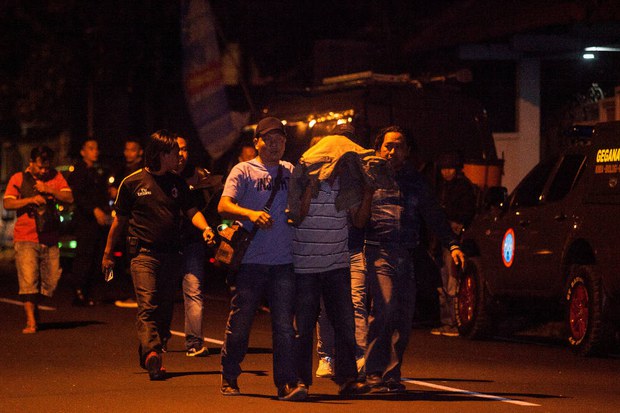Around 180 Terror Suspects Caught Since Mid-May Attacks: Indonesian Police
2018.07.16
Jakarta and Yogyakarta, Indonesia
 Indonesian police detain a potential suspect in Sleman regency, Yogyakarta, after officers said they killed three men who attacked them with machetes, July 14, 2018.
Indonesian police detain a potential suspect in Sleman regency, Yogyakarta, after officers said they killed three men who attacked them with machetes, July 14, 2018.
Indonesian authorities have arrested some 180 suspected militants and killed another 20 linked with Islamic State since a pair of families launched suicide attacks on churches and a police headquarters in Surabaya in mid-May, the national police chief said Monday.
The suspects slain in counter-terror operations, including three killed by police over the weekend in Yogyakarta province, were members of Jamaah Ansharut Daulah (JAD) or Jamaah Ansharut Khilafah (JAK), Gen. Tito Karnavian told reporters. Both militant groups have pledged allegiance to the so-called Islamic State (IS) extremist group.
All the suspects were killed while resisting arrest, Tito said.
Indonesian police have blamed JAD for suicide bombings that killed 27 people, including 13 suspects, during the attacks in Surabaya, Indonesia’s second largest city, on May 13 and 14, as well as other deadly attacks in the country since January 2016.
The number of suspects taken into custody as part of a post-Surabaya crackdown on terror cells nationwide included seven who were arrested in West Java province on Saturday and Sunday, officials said.
“We will not stop expanding our investigation into the Surabaya bombings,” Tito told a press conference at the Mobile Brigade headquarters in Depok, near Jakarta.
The police chief declined to say whether any of the scores of suspects were involved in the Surabaya bombings. He also did not reveal information on how many suspects were still in custody or how many had been charged with terror-related offenses.
Under Indonesia’s newly revised anti-terror laws, authorities can hold suspects for up to 270 days, or nine months, without charging them.
Sleman shootings
On Saturday, officers with police counter-terror squad Densus 88 shot and killed three militant suspects in the Sleman regency of Yogyakarta province when the suspects allegedly attacked them with machetes in an effort to resist arrest, authorities said.
Officers said they attempted to stop four suspects riding on two motorcycles when the attack occurred, causing police to fire at two of the suspects. A third suspect hijacked a truck and took a woman hostage after crashing into a house. Police ended the stand-off by killing the man.
Tito said the fourth suspect escaped capture by police.
The suspects killed in Yogyakarta were members of JAK, a militant group with ties to JAD, according to Tito. The two groups have similarities, former militant Sofyan Tsauri said.
“They have similar targets and views on jihad,” Sofyan told BenarNews, adding that JAK had nothing to do with the Surabaya bombings.
Sofyan said JAK did not plan to attack targets in Yogyakarta because members considered Yogyakarta and the nearby city of Solo, in Central Java province, to be their sanctuaries.
‘We will take action and hunt them’
Elsewhere over the weekend, police arrested seven suspected terrorists in raids across Indramayu, a regency in West Java.
Among those arrested was a married couple who allegedly threw a pressure cooker bomb after crashing the gate of the Indramayu police headquarters early Sunday, West Java police chief Agung Budi Maryoto said.
“The pressure cooker bomb did not explode. The materials were low-grade explosives,” he said.
In the past month alone, police have arrested 25 terror suspects in West Java, he said.
Tito said the incidents in Yogyakarta and Indramayu indicated that militants were pushing back against police following the series of arrests.
“We are keeping tabs on them. We know where their networks are operating. We will take action and hunt them,” he said.
Meanwhile, President Joko “Jokowi” Widodo warned that the terrorism threat was present in Indonesia and urged people to take a stand against it.
“All of us have to be aware that terrorism still exists in our country. I appeal to all members of society to work together with the authorities to tackle this problem,” he said in Central Java on Sunday.
Tito said police were open to talks with JAD, but its members must reach out.
“There’s no way we will initiate a dialogue with them,” he said.
Last month, a Jakarta court sentenced radical Muslim cleric Aman Abdurrahman, JAD’s jailed de facto leader, to death after convicting him of ordering militants to launch a series of attacks from his cell. Those attacks included a suicide mission that left eight people dead, including four gunmen, in central Jakarta on Jan. 14, 2016, the first claimed on Indonesian soil by IS.
Prosecutors said Aman had also inspired militants in a suicide attack that killed three police officers at a bus station in Jakarta last year, as well as a Molotov cocktail blast that killed a 2-year-old and injured three other children at a church in East Kalimantan province in November 2016. He has not been charged with the May attacks in Surabaya.
Tito also said the government is using other approaches to deal with terrorists.
“Even though there are other efforts being made silently, we want to show that the state is stronger than terrorists,” he said.
But Taufik Andrie, a researcher at the Prasasti Perdamaian Foundation, an Indonesian NGO, warned against using repressive tactics in counter-terrorism efforts.
“We hope that arrests are made in accordance with the procedures and there are no wrongful arrests, so as not to lead to more problems,” he said, adding that police should take a persuasive approach in combating radicalism.







